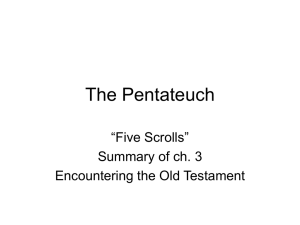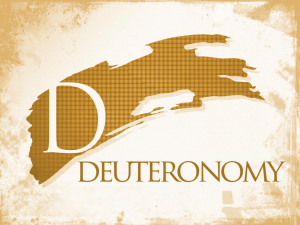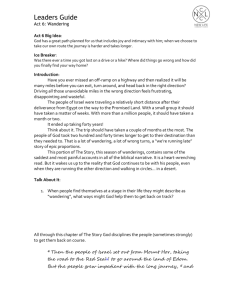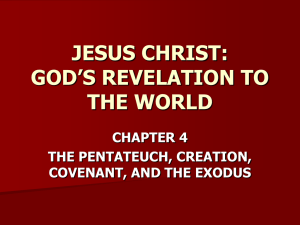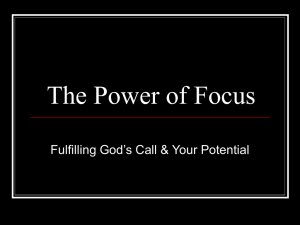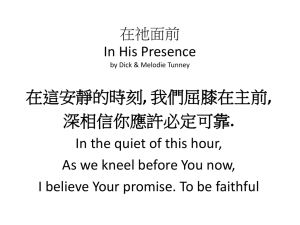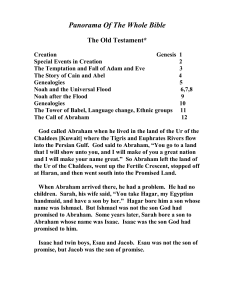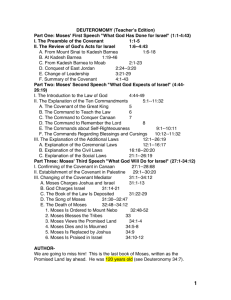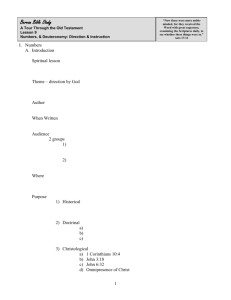MrDBible - Bible Survey
advertisement
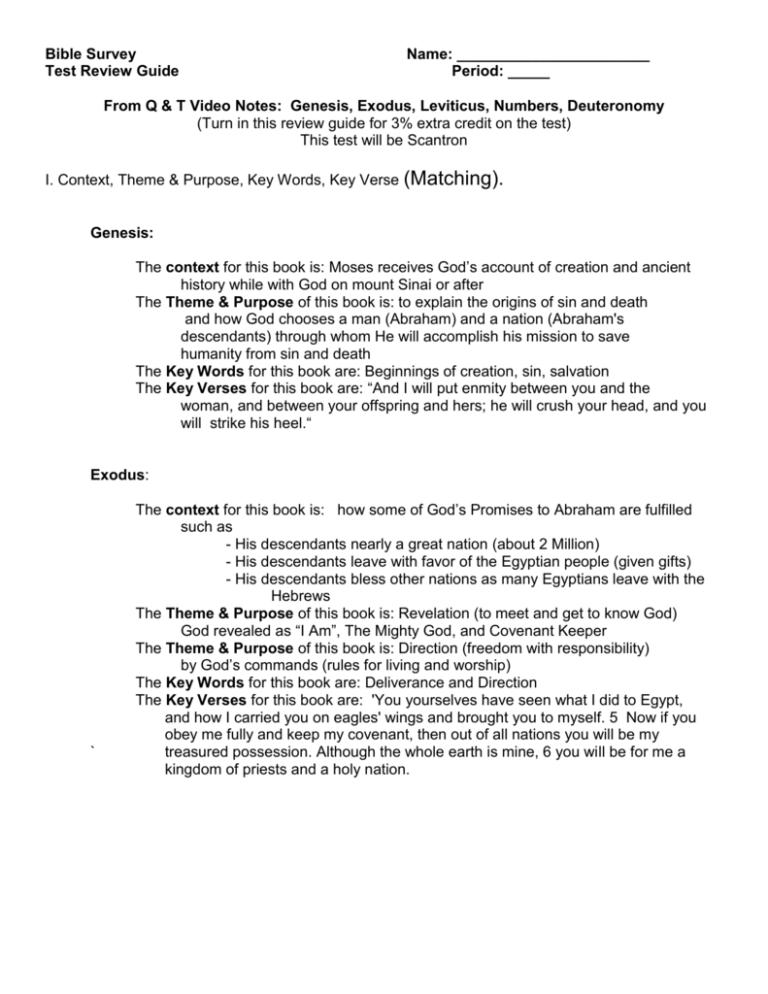
Bible Survey Test Review Guide Name: _______________________ Period: _____ From Q & T Video Notes: Genesis, Exodus, Leviticus, Numbers, Deuteronomy (Turn in this review guide for 3% extra credit on the test) This test will be Scantron I. Context, Theme & Purpose, Key Words, Key Verse (Matching). Genesis: The context for this book is: Moses receives God’s account of creation and ancient history while with God on mount Sinai or after The Theme & Purpose of this book is: to explain the origins of sin and death and how God chooses a man (Abraham) and a nation (Abraham's descendants) through whom He will accomplish his mission to save humanity from sin and death The Key Words for this book are: Beginnings of creation, sin, salvation The Key Verses for this book are: “And I will put enmity between you and the woman, and between your offspring and hers; he will crush your head, and you will strike his heel.“ Exodus: ` The context for this book is: how some of God’s Promises to Abraham are fulfilled such as - His descendants nearly a great nation (about 2 Million) - His descendants leave with favor of the Egyptian people (given gifts) - His descendants bless other nations as many Egyptians leave with the Hebrews The Theme & Purpose of this book is: Revelation (to meet and get to know God) God revealed as “I Am”, The Mighty God, and Covenant Keeper The Theme & Purpose of this book is: Direction (freedom with responsibility) by God’s commands (rules for living and worship) The Key Words for this book are: Deliverance and Direction The Key Verses for this book are: 'You yourselves have seen what I did to Egypt, and how I carried you on eagles' wings and brought you to myself. 5 Now if you obey me fully and keep my covenant, then out of all nations you will be my treasured possession. Although the whole earth is mine, 6 you will be for me a kingdom of priests and a holy nation. Leviticus: The context for this book is: As the people of Israel are encamped around Mount Horeb (Sinai), this book gives instructions about how to use the tabernacle for worship The Theme & Purpose of this book is: How God gives instructions to the Priests and Levites about how to help God's people to worship and have a covenant relationship with a Holy God as his Holy People The Key Words for this book are: Holiness The Key Verses for this book are: “The Lord said to Moses, “Speak to the entire assembly of Israel and say to them: ‘Be holy because I, the Lord your God, am holy.’” Numbers: The context for this book is: After receiving instructions (the Law and Tabernacle) regarding life and worship as the Holy people of God, Israel, under God’s leadership through Moses, set out for the Promised Land (Canaan) only to face the discipline of a 40 year delay. The context for this book is: This book refers to the 2 numberings of the Israelites first at Mount Sinai at the beginning of the book and then on the plains of Moab at the end of the book. The Theme & Purpose of this book is: To show that Israel must justly suffer The consequences for lack of faith that God would be faithful to his promises to provide for them and bring them into the land of Canaan. The Theme and Purpose of this book is: how God trains the younger generation to trust in him and live like him. Not just having the Law of God but conforming to the Law of God out of faith in and love for God and others The Theme & Purpose of this book is: To show that God is not only just but also merciful as he forgives their rebellion and comes to their aid when they repent The Key Words for this book are: Testing and Provision The Key Verses for this book are: “… not one of the those who saw my glory and the miraculous signs I performed in Egypt and in the desert but who disobeyed me and tested me ten times – not one of them will ever see the land I promised on oath to their forefathers. Deuteronomy: The context for this book is: Moses reviews the last 40 years and the Law for the 2nd generation. The Theme & Purpose of this book is: Moses helps Israel anticipate their prosperity in the promised land (God gives it) and Moses helps Israel anticipate their failure in the promised land (they deserve it) The Theme & Purpose of this book is: God calls His people to remember and prepare The Key Words for this book are: Renewal of the Covenant The Key Verses for this book are: “See, I set before you today life and prosperity, death and destruction. For I command you today to love the Lord your God, to walk in his ways, and to keep his commands, decrees and laws; then you will live and increase, and the Lord your God will bless you in the land you are entering to possess. II. Book Highlights: Who’s Who? (Matching) (Give the name(s) of the person being described) Genesis - This child was a type of Jesus Christ because, among other things, he was the only son of his father and he carried the wood for the altar on which he would be sacrificed by his father. - God told this person: And I will put enmity between you and the woman, and between your offspring and hers; he will crush your head, and you will trike his heel.“ -This dude was the favorite son of Jacob. Sold by his brothers as a slave in Egypt. Through a series of trials, he is elevated to a position of great influence as Pharaoh's right hand man, in charge of food distribution during a 7 year famine. - God told this righteous man: I establish my covenant with you: Never again will all life be destroyed by the waters of a flood - God told this father of faith: "I will make you into a great nation, and I will bless you; I will make your name great, and you will be a blessing. I will bless those who bless you, and whoever curses you I will curse; and all peoples on earth will be blessed through you.“ - This glorious person created human beings in his image - God appeared to this trickster in a dream of a ladder and “There above it stood the Lord, and he said: "I am the Lord, the God of your father Abraham and the God of Isaac. I will give you and your descendants the land on which you are lying. Exodus -. The Lord shocked this guy in a burning bush and said: "I have indeed seen the misery of my people in Egypt. I have heard them crying out … So I have come down to rescue them from the hand of the Egyptians Numbers - Who had a donkey warn him of an angel in the path about to kill him? - To whom did God say: "Because you did not trust in me enough to honor me as holy in the sight of the Israelites, you will not bring this community into the land I give them." - Who said that he could not curse those whom God did not curse? - These two men rebelled against Moses and Aaron and were killed when God split the earth and it swallowed these men and their families - This sister of Moses was struck by God with leprosy because she and Aaron challenged Moses’ leadership - Who were the two spies sent into the land of Canaan who brought back the report that if the Lord is pleased with us, he will lead us to take possession of it. Do not rebel, do not be afraid. - This high priest (1st one) was the brother of Moses and had this blessing named after him: “The Lord bless you and keep you; the Lord make his face shine upon you and be gracious to you; the Lord turn his face toward you and give you peace.” - To whom did God say: Moses is faithful in all my house. With him I speak face to face,… Why then were you not afraid to speak against my servant Moses?" -. Who is described in Numbers 12 as a very humble man, more humble than anyone else on the face of the earth? III. Book Highlights: Other Stuff (True / False) A. Genesis: 1. God Scatters Humanity: a. Why was the city called “Babel”? 2. Abraham’s Covenant Sign: a. What was the Covenant that God told Abraham that he and his descendants had to keep? 3. Abraham’s Test of Faith: a. What was Abraham’s test of faith? 4. Joseph responds from God’s perspective a. What did Joseph say to his brothers who sold him into slavery? B. Exodus: 1. What did God do when he heard the groaning of the Israelites? 2. What does God’s personal name, “I AM” / Jehovah convey? 3. What kind of lamb had to be chosen for the Passover meal? 4. Be able to pick out a commandment that is NOT one of the 10 commandments 5. What was the difference between the “Ark of the Covenant” and the “Bread of the Presence” in WHAT THEY SYMBOLIZED? 6. What was the difference between the “Altar of Burnt Offerings” and the Altar of Incense” in WHAT THEY WERE USED FOR? C. Leviticus: 1. What was the difference between a burnt offering and a fellowship offering? 2. What was the difference between the Passover feast and the feast of Pentecost? D. Numbers: 1. Where was the Tabernacle located when Israel set up camp? 2. What led the Israelites when they were traveling? 3. What was “Manna” and why was it a “Type” (Typology) of Jesus Christ? 4. Why was Moses not allowed to bring the Israelite community into the land God was giving them? 5. In Numbers 12, when Miriam and Aaron challenge Moses’ leadership what happens to Miriam? 6. What was the report of 2 of the spies (Caleb and Joshua) sent into the land of Canaan? 7. Even though God forgives Israel for not listening to Caleb and Joshua, what is his judgement against them? E. Deuteronomy: 1. What will Israel’s obedience to the Lord in the promised land gain? 2. What does the word “Shema” mean? 3. Write out the first sentence of Deuteronomy 6:4-8 4. According to Deuteronomy 8:3, why did the Lord humble them causing them to hunger and feed on Manna? 5. According to Deuteronomy 12:13-14, what must Israel be careful NOT to do? 6. How is Deuteronomy 18:18-19 foreshadowing (a type of) Christ? 7. According to Deuteronomy 19:1-4, why were “Cities of Refuge” set up? 8. According to Deuteronomy 30:15-18, Israel was urged to choose life. - what would the consequence be if Israel loved the Lord and walked in his ways? 9. According to Deuteronomy 31:16-17, what did the Lord predict Israel would do when they enter the land of promise? IV. Christianese Terms (Matching) See Quizlet (MrDBible) [note capital letters] From the Genesis – Deuteronomy List Only Confirmation / Profession of faith Atonement Repent Redemption Providence Holy Ethics
